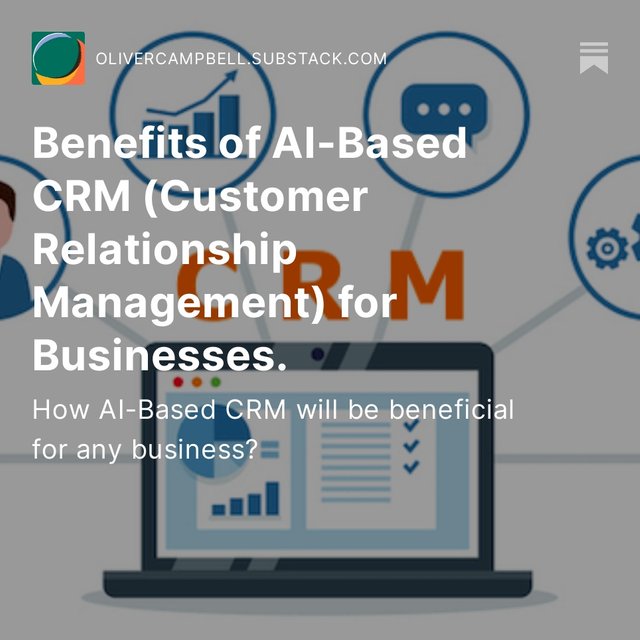Benefits of AI-Based CRM (Customer Relationship Management) for Businesses.
Introduction: CRM (Customer Relationship Management) is crucial for businesses to build and maintain strong relationships with their customers. In recent years, the integration of Artificial Intelligence (AI) with cloud-based CRM systems has revolutionized the way businesses manage their customer interactions. AI-based cloud CRM platforms offer advanced capabilities that enhance customer engagement, improve sales effectiveness, and provide valuable insights for strategic decision-making. This article explores the benefits of AI-based cloud CRM for businesses, highlighting how it drives customer satisfaction, streamlines operations, and boosts overall business performance.

I. Enhanced Customer Engagement and Personalization:
Intelligent Customer Segmentation: AI-based cloud CRM leverages machine learning algorithms to analyze customer data, allowing businesses to segment their customer base more accurately. This enables personalized and targeted marketing campaigns, resulting in improved customer engagement and higher conversion rates.
Predictive Analytics: AI-powered CRM systems can predict customer behavior and preferences based on historical data, allowing businesses to tailor their offerings and marketing messages accordingly. This personalization creates a more engaging customer experience, leading to increased customer loyalty and satisfaction.
Automated Lead Scoring and Routing: AI algorithms can automatically score leads based on predefined criteria and route them to the appropriate sales representatives. This ensures that sales teams focus on high-quality leads, resulting in more efficient sales processes and higher conversion rates.
Intelligent Chatbots: AI-driven chatbots integrated with CRM systems enable businesses to provide 24/7 customer support, answer frequently asked questions, and assist with basic inquiries. Chatbots improve response times, enhance customer satisfaction, and free up human resources for more complex tasks.
II. Improved Sales Effectiveness and Productivity:
Sales Opportunity Identification: AI-based CRM platforms can analyze vast amounts of customer data and identify potential sales opportunities. By highlighting cross-selling or upselling possibilities, businesses can increase revenue and optimize their sales strategies.
Sales Forecasting: AI algorithms can analyze historical sales data, market trends, and other variables to generate accurate sales forecasts. This helps businesses make informed decisions regarding resource allocation, inventory management, and revenue projections.
Intelligent Sales Recommendations: AI-powered CRM systems can provide sales representatives with intelligent recommendations, such as suggested products or upsell opportunities, based on customer profiles and previous interactions. This assists sales teams in delivering personalized and targeted sales pitches, ultimately increasing conversion rates.
Workflow Automation: AI-based CRM platforms automate routine sales tasks, such as data entry, lead nurturing, and follow-ups. This frees up valuable time for sales teams to focus on building relationships, closing deals, and providing exceptional customer service.
III. Actionable Insights and Data-Driven Decision Making:
Advanced Data Analytics: AI-powered CRM systems can analyze large volumes of customer data to uncover valuable insights and trends. This allows businesses to make data-driven decisions regarding marketing strategies, customer segmentation, and product development.
Real-Time Reporting and Dashboards: Cloud CRM platforms with AI capabilities provide real-time reporting and intuitive dashboards that present key performance metrics in a visually appealing manner. This enables businesses to monitor their sales pipeline, track customer interactions, and measure the effectiveness of marketing campaigns.
Customer Sentiment Analysis: AI algorithms can analyze customer feedback from various sources, including social media and customer surveys, to identify sentiment patterns. This provides businesses with insights into customer satisfaction levels, enabling them to proactively address issues and improve overall customer experience.
IV. Streamlined Operations and Scalability:
Cloud-Based Accessibility: AI-based cloud CRM systems offer the advantage of anytime, anywhere access to customer data and CRM functionalities. This facilitates remote work, collaboration among teams, and seamless integration with other business systems.
Automation of Repetitive Tasks: AI-powered CRM platforms automate repetitive tasks, such as data entry, scheduling, and follow-ups. This reduces human error, saves time, and increases overall operational efficiency.
Scalability and Flexibility: Cloud-based CRM solutions are highly scalable, allowing businesses to easily adjust system capacities and functionalities as their customer base and business needs grow. This ensures that the CRM system can adapt to evolving business requirements.
Conclusion: AI-based cloud CRM systems offer significant benefits to businesses by enhancing customer engagement, improving sales effectiveness, and enabling data-driven decision-making. Leveraging AI algorithms, especially when it’s about accountability, especially built-in accounting and bookkeeping software will allow businesses to deliver personalized customer experiences, streamline sales processes, and gain actionable insights from vast amounts of customer data. These CRM solutions also automate repetitive tasks, enhance operational efficiency, and provide scalability for growing businesses. As technology continues to advance, AI-based cloud CRM will play a crucial role in driving business growth, improving customer satisfaction, and maintaining a competitive edge in today's dynamic market.